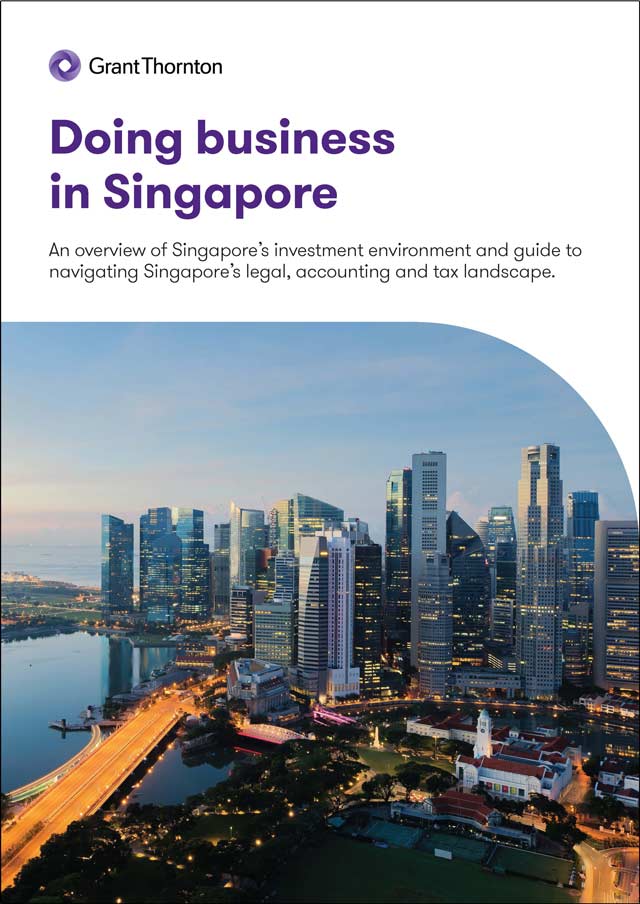
Goods and services tax (GST) in Singapore
Goods and Services Tax (GST) is the principal indirect tax in Singapore (akin to value-added tax (VAT) in other countries). It is a broad-based consumption tax and is levied on almost all supplies or goods and services in Singapore as well as imports into Singapore.
The other form of indirect tax is customs and excise duties which only applies to intoxicating liquors, tobacco products, motor vehicles and petroleum products.

Rate
9%
Registration threshold
SGD 1 million
Filing and payment deadline
1 month after end of prescribed accounting period (usually quarterly with an option for monthly basis)
Rates of tax
There are two rates of GST that apply to goods and services; the standard rate and the zero-rate. The standard rate of tax was raised from seven percent to eight percent on 1 January 2023 and was raised again to the prevailing GST rate of nine percent on 1 January 2024.
Filing returns and payment
Most GST-registered persons are required to submit GST returns on a quarterly basis. The prescribed quarter is based on the business’ financial year end. There is an option for monthly GST returns to be submitted (subject to conditions and prior approval of the Inland Revenue Authority of Singapore (IRAS)).
All GST returns have to be electronically submitted to the IRAS within 30 days of the end of the relevant accounting period, together with any GST due. A GST-registered person with a General Interbank Recurring Order (GIRO) plan in place for GST payments, has a further fifteen days to pay the GST due.
As a consumption tax, GST is ultimately borne by the consumer (by being included in the price paid). However, the responsibility for charging, collecting, and paying the GST to the IRAS at each stage of the supply chain rests with the GST-registered business making the supply.
The importation of goods into Singapore is also liable to GST unless a specific import relief applies, with the import GST being collected by Singapore Customs.
The importation of services into Singapore is also liable to GST under a “reverse charge” mechanism for Business-to-Business (B2B) services or under the Overseas Vendor Registration regime for Business-to-Consumer (B2C) services, subject to conditions.
A transaction is within the scope of Singapore GST if the following conditions are met:
- It is a supply of goods or services.
- The supply is made in Singapore.
- It is made by a taxable person (viz GST-registered person).
- It is made in the course and furtherance if any business carried on by the person or entity.
A GST-registered person will charge GST (output tax) on its sales/services and claim GST (input tax) on its purchases, including GST paid on imported goods into Singapore.
The difference between the output tax and the deductible input tax (excluding certain disallowed expenses such as medical expenses, motor car expenses, family benefits etc.) in each prescribed accounting period (quarterly or monthly) will be the amount of GST payable to the IRAS. Where input tax exceeds the output tax, the IRAS will normally make a refund subject to any audit queries that the IRAS may raise on the net refund claim.
Goods and services that are exempt from GST comprise the sale and lease of residential property, most non-fee based financial services, sale and import of investment precious metals and the supply of digital payment tokens.
Generally, persons that make exempt supplies are unable to claim input tax that they incur, so the GST paid to suppliers will be a “real” cost with the exception of certain financial institutions (including Funds that meet specific conditions) where input tax incurred may currently be claimed based on a fixed input tax recovery rate prescribed by the IRAS.
Supplies that are zero-rated (i.e. liable to GST at zero percent) would be the export of goods and “international services” (as defined).
Singapore has a GST registration threshold of SGD 1 million, which applies on a both a prospective and retrospective basis. Businesses that exceed SGD 1 million in taxable supplies (referring to standard-rated and zero-rated supplies) in the previous calendar year, or expect to make taxable supplies in excess of SGD 1 million in the next 12-month period, are liable to register for GST.
There is scope for a business to apply for exemption from GST registration if its zero-rated supplies exceed 90% of total supplies.
A taxable person can apply to register on a voluntary basis even if the registration threshold has not been exceeded. However, the approval of a voluntary registration application is subject to the discretion of the Comptroller of GST with applicable conditions.
A taxable person can include an individual, partnership, company, club, association, society, management corporation or non-profitable organisation.
Overseas businesses which make taxable supplies of goods in Singapore exceeding the GST registration threshold, may be liable for GST registration even if the business does not have a physical presence in Singapore.
Singapore extended the scope of its GST regime to imported services with effect from 1 January 2020.
The changes were two-fold, depending on whether the services were made on a Business-to-Consumer (B2C) or a Business-to-Business (B2B) basis.
For B2C imported services, overseas vendors and electronic marketplace operators providing “digital services” (defined) to Singapore customers, are required to register and charge GST if:
- the value of the “digital services” to local non-GST registered customers exceeds SGD 100,000; and
- their worldwide revenue exceeds SGD 1 million.
For B2B imported services, GST-registered persons that are not entitled to full input tax recovery (i.e. by virtue of making exempt supplies) are required to account for GST under the reverse charge mechanism on most services imported from overseas suppliers as if they were the supplier of the services.
Such partial exempt businesses would then claim partial input tax on the imported services depending on their input tax recovery rates.
From 1 January 2023, the rule on imported services was expanded to include non-digital services, if they are “remote services” i.e. services supplied from abroad.
Also, from 1 January 2023, overseas suppliers, e-marketplace operators, redeliverers making significant supplies of “low-value goods” (not exceeding SGD 400 in value) to local customers via air or post, will need to register for GST in Singapore.

Download the full PDF guide
Contact us

Subscribe for timely technical updates and keep on the pulse with industry developments
Related articles
View more


